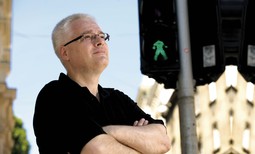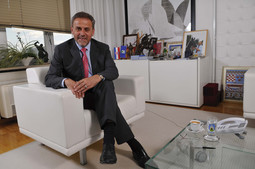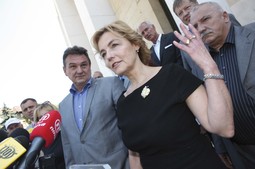IN SEARCH OF THE POLITICAL CENTRE Hebrang has a fundamental problem, and that is that he is exclusively a right-wing candidate, and he has of late tried to win over the voters who support the political centreHad Croatia's presidential elections been held in mid July the SDP's nominee Ivo Josipovic would have scored a convincing victory over the HDZ's Andrija Hebrang. In the runoff vote the Social Democratic Party nominee would take as much as 63 percent of the vote, and the ruling party's candidate a paltry 28 percent. These are the results of a big in-field opinion poll the Puls agency carried out these last weeks for the Croatian People's Party (HNS). Pollsters surveyed the popularity of five relevant presidential nominees - Ivo Josipovic, Vesna Pusic, Radimir Cacic, Nadan Vidosevic and Andrija Hebrang - and it turns out that the Social Democratic Party nominee has a convincing lead by all parameters. Josipovic would win the most votes in the first round, and in the second round his lead over the competition would increase. The conclusion is very precise and suggests that, about six months ahead of the elections, Ivo Josipovic has gained a significant lead ahead of the other contenders, regardless of whether his opposition is from the political left or right-of-centre.
His lead is evident in the first round, where he would win 32 percent of the vote, followed by Andrija Hebrang with 18, Nadan Vidosevic with 15, Radimir Cacic with 12 and Vesna Pusic, who is supported by 11 percent of those surveyed. Especially interesting is the fact that Josipovic would score the greatest lead in the runoff vote against Hebrang. A 63-28 result tells of a more than double advantage and Hebrang is already in a tough situation at the start of the campaign. Pollsters were also interested in what voters would do if the other three candidates made it into the second round, and it turns out that the SDP Member of Parliament remains the convincing winner even in that case. If he were to face Vesna Pusic in the second round, Josipovic would win 62 percent to 23 percent (the remaining 15 percent remains undecided), while against Cacic he would win 59 to 29 percent.
It turns out that Josipovic's biggest threat is from Vidosevic, whom he would also beat, but with the narrowest margin of 52 to 32 percent. Nadan Vidosevic is still weighing whether to join the race, but the results of the HNS survey speaks in favour of those who feel that the top man at the Croatian Chamber of Commerce has good odds. Judging by these results, Vladimir Seks was obviously in the right when he tried to secure the HDZ's support of the Vidosevic nomination, arguing that his chances are significantly greater than Hebrang's.
Seks' plan fell through and it appears that this decision by the HDZ could cost it the presidential elections. Another argument in Josipovic's favour is the fact that he would get 60 percent of the vote of people who voted for the SDP in 2007, and that indicates that there is still a big reserve of voters on the left. If he succeeds in winning their votes, his chances are even better. And so Ivo Josipovic, just two weeks after having beaten Ljubo Jurcic at the party's primaries, has become the top contender to succeed Stipe Mesic. He intends to present his three top aides soon, Miranda Mrsic, Ivan Racan and Dean Sudac, and is campaign will, as regards strategy, be significantly different from the way in which the SDP went to the polls at the elections for Parliament two years ago. At issue are a number of completely new political messages with which the SDP and Ivo Josipovic intend to win over the voters of the right-of-centre. At the time the SDP unreasonably broached the issue of scrapping religious education in schools and clashed with the Catholic Church, which hurt them significantly. The bishops again at the local elections this past May, admittedly much more implicitly than before, backed the parties of the right-of-centre and the SDP wants to prevent leading Church officials from again suggesting to voters whom they should vote for at the presidential elections.
That is why Josipovic met with Cardinal Josip Bozanic a month ago and during a meeting that lasted several hours presented his presidential manifesto, "A New Justice". The meeting was held in a positive mood and Bozanic and Josipovic agreed on most points. But this example has again confirmed a certain level of naďveté in the policies of the SDP presidential nominee, who has decided to remain quiet about a meeting that has a number of political implications.
Nacional learned of the meeting from people in the Church, and when it asked Josipovic to comment the answer we received was that it was not proper to discuss private conversations. This is an ethically acceptable position, by politically naďve, even counter-productive. In a country in which 88 percent of the population declares itself Catholic, the SDP should publicise these kinds of meetings as a kind of proof of a mending of contacts with influential bishops.EYES ON DALMATIA Josipovic will try to take away Hebrang's votes in two other groups of voters: veterans and the people of Dalmatia
An important aspect of the Ivo Josipovic campaign is the electorate he is trying to win over. From the get-go he can count on most left-wing voters, especially in urban regions such as Primorje, Istria, Zagreb and northwestern Croatia. That support is quite certain, especially if one keeps in mind that Josipovic will not make the mistake Ljubo Jurcic did in several times relativising the Ustashe movement or defending Marko Perkovic Thompson. As a result of his leftist family roots, Josipovic does not have any such rightist sentimentality and would not easily fall into those kinds of critical situations.
Secure on the left, he is now trying to win as many votes as he can among the one-third of Croatian voters that lean to the centre. The HNS opinion poll in which he has a convincing lead over Hebrang, but also over Cacic, Vidosevic and Vesna Pusic, who are close to the political centre, shows that he also enjoys solid support in that portion of the electorate. Over the coming months Josipovic plans to tour Croatia, and he will then direct much of his campaign activities towards that portion of the electorate.
On that side his public appearances, in which there is not much passion and fiery verbal rhetoric, could prove to be an advantage. It appears that many voters value composure and seriousness as the basis of his public image, even though within the SDP there are those who say that "someone who can't bring people to their feet even in a movie theatre will be hard-pressed to become president." These doubts are for now repudiated by the polls, which give Josipovic a convincing lead. Top SDP officials on Saturday confirmed for Nacional that a public opinion poll they have carried out recently also yielded results very similar to that of the HNS poll.
The third significant change from the 2007 campaign concerns the Diaspora. Josipovic has confirmed decidedly for Nacional that part of his campaign would include visiting the Croatians in Bosnia & Herzegovina and in some other countries. This is the first time that a relevant SDP politician has supported the "Diaspora's" right to vote and made a key reversal in the policy of the leading left-wing party in Croatia. During the era of Ivica Racan the SDP was passionate in its criticism of the Diaspora's participation in Croatian elections, and in 2007 one of the key election messages delivered by Zoran Milanovic was that only those living in Croatia could decide on who would govern the country.
ZAGREB MAYOR Milan Bandic could leave the party and make an independent bid for the presidency, which could threaten Josipovic's march on the office of presidentThat is why he rejected Milan Bandic's offer to bring votes in Herzegovina to the SDP, and the criticism of the Diaspora also did not bring about positive reactions in Croatia. The HDZ used the situation and won as many as five MP's from the neighbouring country. It is, of course, clear to Josipovic that he too cannot hope to win many votes in Bosnia & Herzegovina, and that is in fact what is indicative of how much has changed in the way of thinking within the SDP in just two years. The Diaspora was, until recently, a taboo topic, and is now slowly being seen as something quite normal. And the presidential elections will serve more as a dress rehearsal to gauge how the SDP fares among the Croatians in Herzegovina and what it can count on at the next elections for Parliament.
This situation could significantly increase the role played by Milan Bandic, currently the best-known Herzegovinian on the Croatian political scene. He faces two options - to leave the SDP and try for an independent bid for the presidency, which would be very risky, or to remain in the party and cover the Diaspora vote, which could also bolster his position within the SDP. There is no doubt that Josipovic would like to see Bandic as an ally, and in return that would protect the Zagreb Mayor from attacks from the SDP headquarters. Josipovic will try to deprive Hebrang of some of the vote from two other groups of voters, and those are veterans and the people of Dalmatia. The SDP nominee is from Makarska and believes that he will win over some of the Dalmatian voters who have up to now usually voted HDZ. That trends are shifting was seen at the local elections when the opposition and independent candidates took power in Dubrovnik, Split and Sibenik, even though the HDZ still holds most of the region.
The situation with veterans is similar, and their associations are led by people close to the HDZ. That is why Ante Kotromanovic will play an important role in the Josipovic campaign, and should convince a part of this electorate to not support Hebrang.
Hebrang's position is not rosy, even though it looks like he is at the moment the most likely nominee to make it to the runoff vote. But the long-time unofficial leader of the HDZ's right wing will be hard pressed to achieve any more than that. His only advantage is the support he can count on as the HDZ candidate, but that this is not the key factor in a presidential campaign was felt in 2000 by Mate Granic and in 2005 by Jadranka Kosor, who were solidly beaten by Mesic. The presidential elections are very focused on personality, and even the support of leading parties is no guarantee of victory. Andrija Hebrang has a fundamental problem, and that is that he is exclusively a right-wing candidate. Ever since his presidential nomination was announced last Wednesday, Hebrang has launched his spin program. He knows which voters he can always count on and is now trying to win over those that lean to the political centre. That is the only light in which one needs regard his distancing from Roncevic and the conciliatory evaluations of his political opponents. But whoever ends up leading his campaign will find him or herself in the unenviable role of justifying a politician who has admitted to telling untruths, and depicted that as something quite understandable and not at all immoral.
Hebrang is also linked to one of the biggest corruption scandals of the past, the Shimadzu Affair, and post-2003 he spearheaded the sacking of hospital directors that had been appointed during the SDP administration. And as a member of cabinet and the top person in the Croatian healthcare system, after he was diagnosed with prostate cancer, he turned down treatment in Croatia and went for an operation in Innsbruck. He showed by his own example how little faith he has in Croatian healthcare.
It appears that in the HDZ they have a similar view of Hebrang's presidential hopes, which is why the idea was floated that Stipe Mesic's term be extended by a year. The attempt is quite hopeless because there is absolutely no need for it. It is true, Croatia is passing through a tough economic crisis, but these are by no means the kind of extraordinary circumstances that would warrant suspending the democratic procedure. Besides, the opposition is well aware that it has a unique opportunity to take power and the presidential elections are the first stage in the whole operation. And that is why nobody is even considering putting off the presidential elections.
And in the meantime Vesna Pusic will spend at least a few more months in the presidential race, and during that time evaluate her chances. Her associates say that as president she would significantly improve Croatia's international standing, which is her key advantage over Josipovic.HNS NOMINEE Vesna Pusic, whom Radimir Cacic proposed for the presidential elections, is supported in the first round by 11 percent of those polled
The thing is that the HNS wants to use the presidential elections to wrangle concessions from the SDP for the next elections for Croatian Parliament. That means that Vesna Pusic - if polls do not in the meantime show a marked rise in her popularity - will drop out of the race in the autumn and endorse Josipovic. In return the SDP would sign a deal on a joint election campaign with the HNS and IDS, which in the event of a victory implies a deal on a future government. This scenario is particularly likely if the presidential and parliamentary elections are held at the same time, and that means that Jadranka Kosor's Government would have to fall by the end of this year.
Meeting with Seks at a reception
■ And while Nadan Vidosevic and Vladimir Seks have denied taking part in a meeting in Zadar to discuss the possible HDZ support of a Vidosevic bid for the presidency, eyewitnesses say the meeting was in fact held after the José Carreras concert, at a VIP reception in the foyer of the Museum of Archaeology, very close to the Forum where the concert was staged. It was at this reception, sampling beverages and hors d'oeuvres, that Seks and Vidosevic were in conversation for over an hour, Nacional has been told by some of those on hand. Also in their company was Deputy Prime Minister Durda Adlesic. This information differs significantly from what the two told the press, claiming that the meeting in question had never taken place. In an interview for the Jutarnji list daily Seks said that he had only exchanged two sentences with Vidosevic before the concert because they were seated close to one another, and that his recent criticism of Ivo Sanader had earned him a poor rating in the HDZ. Seks also said he told Vidosevic that he would be thrown out of the party if he made an independent bid for the presidency. But Nacional has photos on which it is evident that the distance between the seats occupied by Seks and Vidosevic respectively were at least five metres apart and it is hard to understand how Seks could have communicated with Vidosevic from his seat without shouting at the top of his lungs, which he certainly did not do. And both Seks and Vidosevic publicly claimed to have left Zadar half an hour after the concert, but eyewitness reports say otherwise. They say that Seks did in fact criticise Vidosevic for being critical of Government, but that he did so during their discussion at the reception, and that he then offered him the possibility of being the HDZ nominee. Nacional's sources say that Seks made the offer in his well-known semi-serious style, and that the discussion appeared to be Seks' feeling out of Vidosevic's level of interest. The head of the Chamber of Commerce appeared interested, but when the story appeared in the press they clearly agreed to publicly deny that the discussion ever took place.








